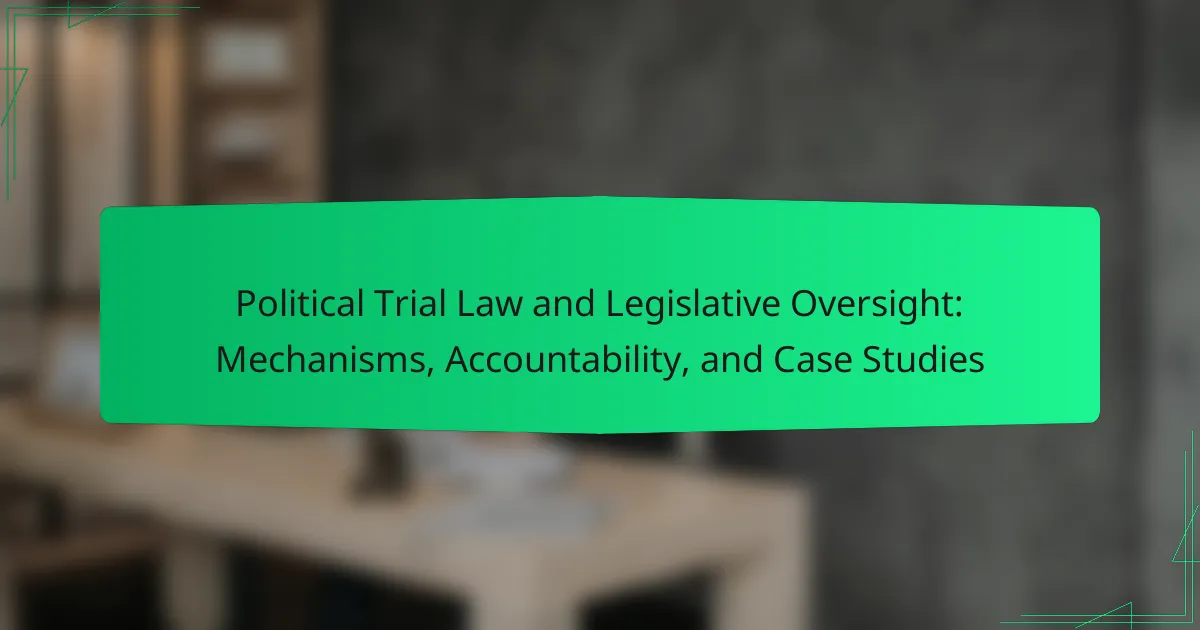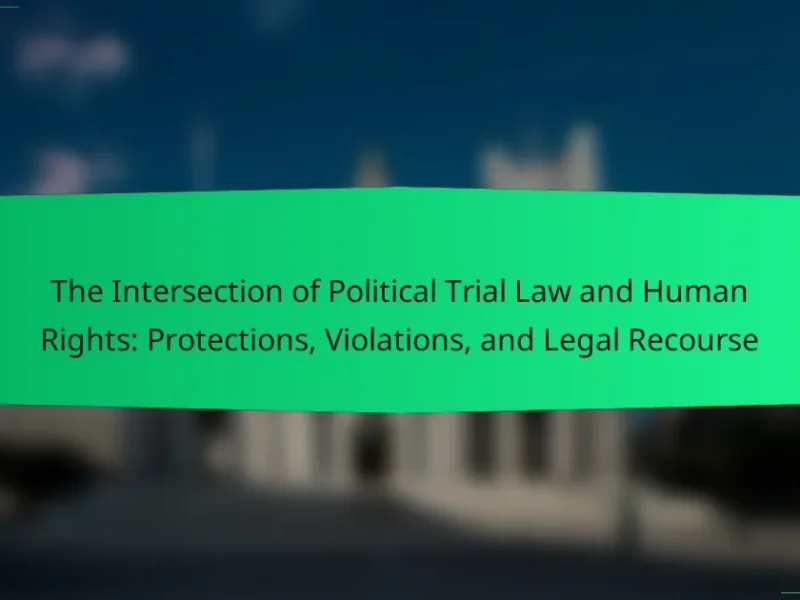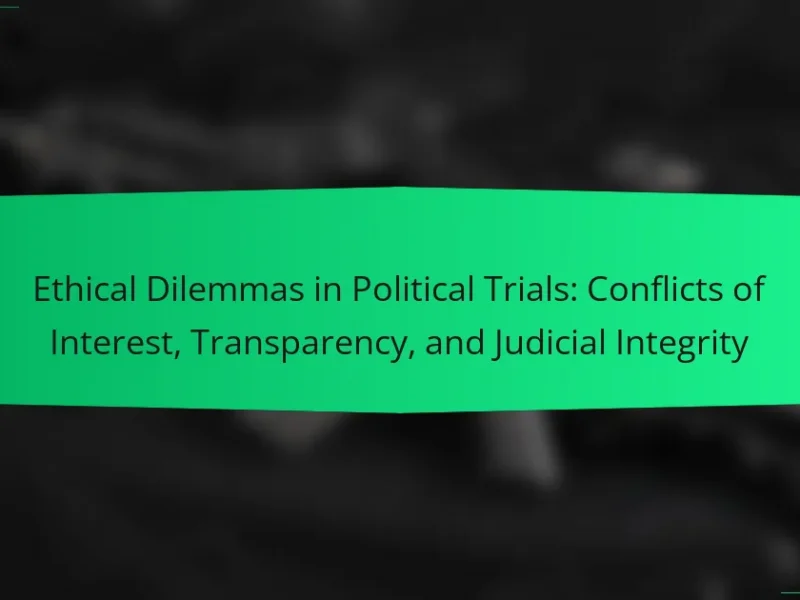Political Trial Law encompasses the legal framework that governs trials involving political figures or issues, while Legislative Oversight refers to the review and supervision of government actions by legislative bodies to ensure accountability and transparency. This article examines the intersection of these two concepts, highlighting mechanisms such as judicial oversight, legislative scrutiny, and public transparency that uphold checks and balances in a democratic system. It also explores notable case studies, including the impeachment trials of U.S. Presidents Andrew Johnson, Bill Clinton, and Donald Trump, illustrating the complexities of political trial law and its implications for accountability in government. Through these examples, the article emphasizes the importance of maintaining trust and integrity within political processes.
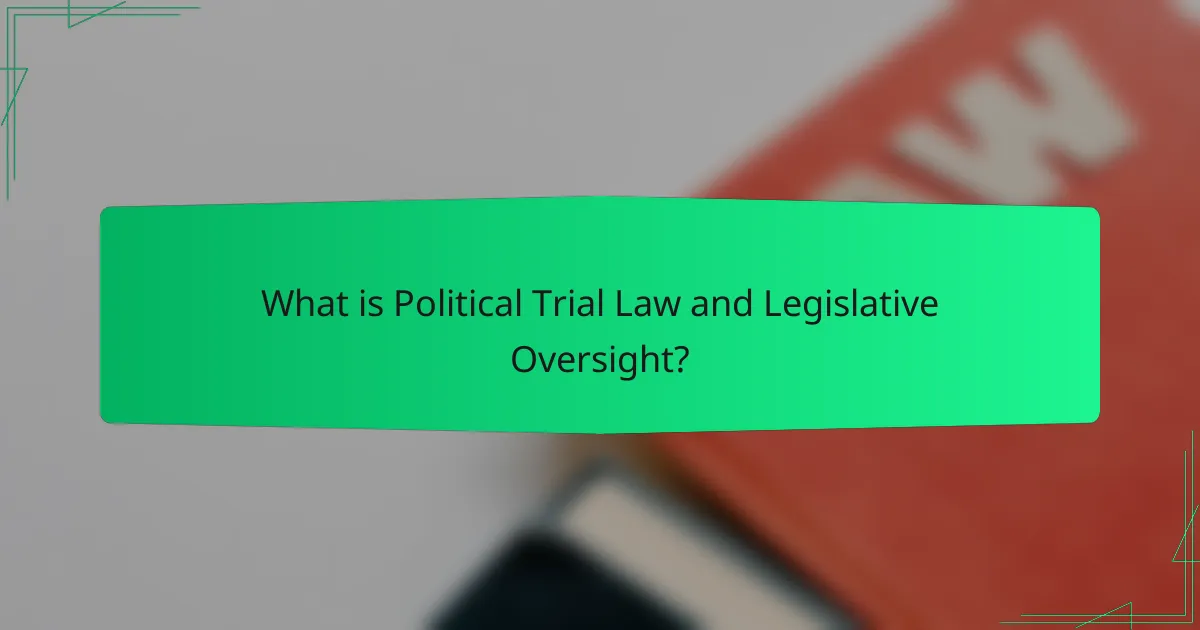
What is Political Trial Law and Legislative Oversight?
Political Trial Law refers to the legal framework governing trials that involve political figures or issues. Legislative Oversight involves the review, monitoring, and supervision of government actions by a legislative body. These mechanisms ensure accountability and transparency in government. Political Trial Law often intersects with legislative oversight when legislative bodies investigate misconduct or legal violations by officials. Historical examples include impeachment trials, which are a form of political trial. Legislative oversight can lead to reforms based on findings from such trials. Both concepts play crucial roles in maintaining checks and balances in a democratic system.
How do Political Trials differ from Regular Trials?
Political trials differ from regular trials primarily in their purpose and context. Political trials often involve cases where the defendant is a political figure or the case has significant political implications. Regular trials typically focus on criminal or civil matters without political context.
In political trials, the legal proceedings may be influenced by public opinion and political agendas. This contrasts with regular trials, where decisions are primarily based on legal standards and evidence.
Additionally, political trials can lack impartiality due to the involvement of governmental entities. Regular trials generally adhere to established judicial processes to ensure fairness.
Historical examples include the impeachment trials of U.S. presidents, which reflect political motivations. In contrast, regular trials focus on upholding the law without political interference.
What are the legal frameworks governing Political Trials?
Legal frameworks governing political trials include national constitutions, international human rights treaties, and specific statutes. National constitutions often outline the rights of defendants and the procedures for trials. International human rights treaties, such as the International Covenant on Civil and Political Rights, set standards for fair trial rights globally. Specific statutes may address the conduct of political trials, including the definition of political offenses and rules of evidence. Historical examples include the Nuremberg Trials, which established principles of accountability for political leaders. These frameworks aim to ensure justice while balancing state interests and individual rights.
How do political motivations influence trial outcomes?
Political motivations can significantly influence trial outcomes by shaping judicial decisions and jury perceptions. Judges may feel pressure to align with political interests, which can affect rulings. Political affiliations of jurors can lead to biased verdicts, swaying the outcome based on external influences rather than facts. Additionally, public opinion driven by political agendas can pressure legal actors to act in ways that favor certain outcomes. Historical cases, such as the impeachment trials in the United States, illustrate how political context alters judicial proceedings. Research indicates that political considerations can overshadow legal principles, impacting the fairness of trials.
Why is Legislative Oversight important in Political Trials?
Legislative oversight is important in political trials because it ensures accountability and transparency in government actions. This oversight allows legislative bodies to monitor the executive branch and judicial processes. It helps prevent abuses of power during political trials. Legislative oversight can also protect the rights of individuals involved in these trials. Furthermore, it fosters public trust in the political system. Historical examples, such as Watergate, demonstrate how oversight can uncover misconduct. Effective oversight mechanisms can lead to reforms that strengthen democratic processes. Thus, legislative oversight plays a critical role in maintaining the integrity of political trials.
What mechanisms exist for Legislative Oversight?
Legislative oversight mechanisms include hearings, investigations, audits, and reports. Hearings allow legislators to question officials and gather information. Investigations enable deeper inquiries into specific issues or allegations. Audits assess the performance and compliance of government agencies. Reports provide summaries of findings and recommendations. These mechanisms enhance accountability and transparency within government operations. Historical examples include the Watergate hearings, which showcased the power of legislative oversight in addressing misconduct.
How does Legislative Oversight enhance accountability?
Legislative oversight enhances accountability by allowing legislative bodies to monitor and evaluate the actions of the executive branch. This process ensures that government officials are held responsible for their decisions and actions. Legislative committees conduct hearings and investigations to gather information on government operations. They can demand reports and testimonies from officials, ensuring transparency. This scrutiny deters misconduct and promotes ethical behavior among public officials. Historical examples, such as the Watergate scandal, illustrate how oversight can reveal abuses of power. Consequently, legislative oversight plays a critical role in maintaining checks and balances within government.
What are the key components of Political Trial Law?
The key components of Political Trial Law include jurisdiction, procedure, and standards of proof. Jurisdiction defines the authority of courts to hear political trials. Procedure outlines the steps and rules governing the trial process. Standards of proof determine the level of evidence required to establish guilt or innocence. These components ensure that political trials are conducted fairly and transparently. Historical examples, such as the impeachment trials in the U.S., illustrate how these components function in practice.
What roles do judges and juries play in Political Trials?
Judges and juries play critical roles in political trials. Judges oversee the legal process and ensure adherence to the law. They determine the admissibility of evidence and provide instructions to juries. In political trials, judges may also address issues of bias or conflicts of interest. Juries, on the other hand, are responsible for evaluating the evidence presented. They deliberate on the facts to reach a verdict. In some cases, juries may face challenges due to public opinion or political pressure. Their decisions can have significant implications for political accountability and justice. Historical examples, such as the trial of former Illinois Governor Rod Blagojevich, illustrate the complexities judges and juries navigate in political contexts.
How do evidentiary standards differ in Political Trials?
Evidentiary standards in political trials differ significantly from those in criminal or civil trials. Political trials often prioritize political considerations over strict legal standards. The burden of proof may be lower in political trials, focusing on the perception of wrongdoing rather than concrete evidence. Additionally, the rules of admissibility for evidence can be more flexible, allowing broader interpretations. In some cases, hearsay evidence may be permitted, which is typically restricted in standard legal proceedings. This flexibility reflects the political nature of the trials, where the outcome may hinge on public opinion rather than legal precedent. Historical examples, such as impeachment proceedings, illustrate these differences, as political motivations can shape the evaluation of evidence.
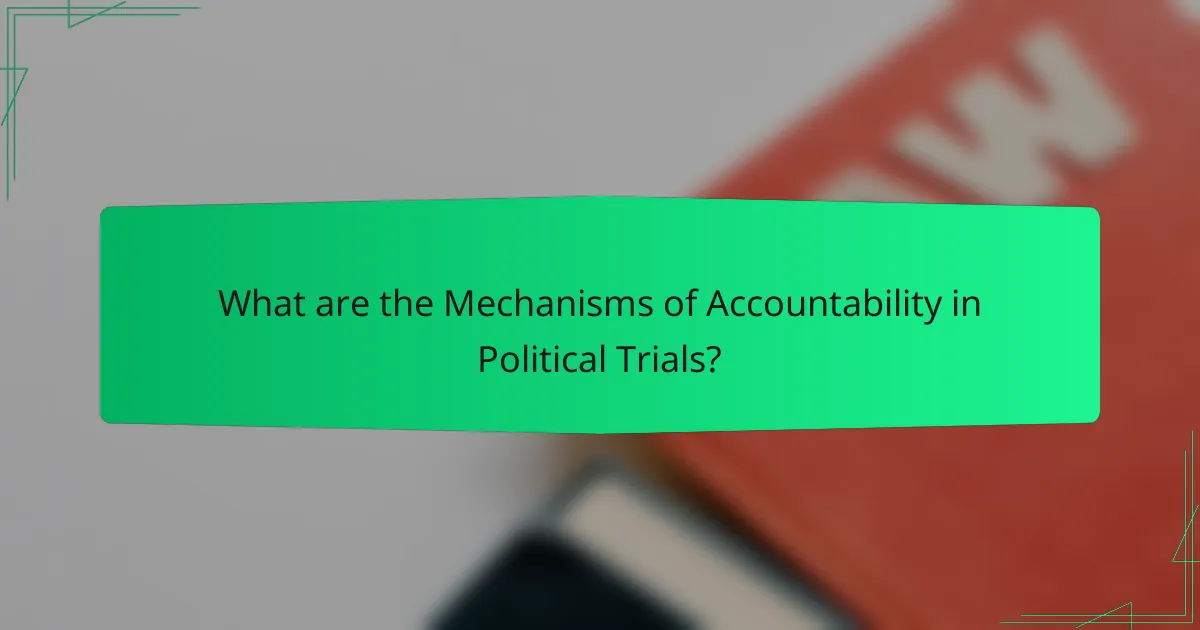
What are the Mechanisms of Accountability in Political Trials?
Mechanisms of accountability in political trials include judicial oversight, legislative scrutiny, and public transparency. Judicial oversight ensures that trials adhere to legal standards and principles. This involves courts reviewing the legality of actions taken during the trial process. Legislative scrutiny allows legislative bodies to investigate and assess the conduct of political trials. Committees may hold hearings to evaluate evidence and procedures used. Public transparency is crucial for maintaining trust in the judicial process. Open trials and accessible records enable citizens to observe proceedings. Historical examples, such as the impeachment trials in the United States, illustrate these mechanisms in action. They demonstrate how accountability is enforced through checks and balances within the political system.
How do checks and balances function in the context of Political Trials?
Checks and balances in political trials ensure that no single branch of government holds excessive power. This system divides authority among the legislative, executive, and judicial branches. Each branch can limit the powers of the others, promoting accountability. For instance, the legislature may oversee the judicial process during a political trial. Additionally, the judiciary can rule on the legality of legislative actions. Historical examples, such as the impeachment trials of U.S. presidents, illustrate this dynamic. These trials require cooperation and scrutiny from multiple branches. Ultimately, checks and balances maintain fairness and uphold the rule of law in political trials.
What role do independent bodies play in ensuring accountability?
Independent bodies play a crucial role in ensuring accountability by providing oversight and evaluation of governmental actions. They operate independently from political influences, which allows for unbiased assessments. These bodies often investigate misconduct and ensure compliance with laws and regulations. For example, independent auditors review government spending and operations to identify inefficiencies or corruption. Their findings are critical for public trust and transparency. Additionally, independent bodies can recommend reforms based on their evaluations, promoting better governance. Their authority to act autonomously strengthens the accountability mechanisms within political systems.
How can public opinion impact the accountability of Political Trials?
Public opinion can significantly impact the accountability of political trials. When the public expresses strong views, it can influence judicial processes. High levels of public scrutiny can lead to increased transparency in political trials. This scrutiny may compel authorities to ensure fair proceedings. Additionally, public opinion can shape legislative oversight of political trials. Lawmakers may respond to constituents’ concerns by implementing reforms. Historical instances show that public outcry has led to changes in trial practices. For example, the Watergate scandal saw public pressure leading to accountability measures. Overall, public opinion serves as a check on the political trial system.
What are the challenges to accountability in Political Trials?
Challenges to accountability in political trials include bias, lack of transparency, and political interference. Bias can arise from judges or juries with personal stakes in the outcome. This undermines the fairness of the trial process. Lack of transparency can lead to public distrust. When proceedings are not open, the legitimacy of outcomes is questioned. Political interference often compromises judicial independence. External pressures can influence verdicts or sentencing. Historical examples, such as the Nuremberg Trials, illustrate these challenges. They faced scrutiny over perceived victor’s justice and selective prosecution. These factors collectively hinder accountability in political trials.
How does political influence obstruct accountability mechanisms?
Political influence obstructs accountability mechanisms by creating biases that favor certain interests over impartial oversight. This influence can lead to the manipulation of regulatory bodies and the undermining of independent investigations. For instance, political actors may pressure agencies to overlook misconduct or delay investigations. This results in a lack of transparency and erodes public trust in institutions. Additionally, political connections can protect individuals from consequences, allowing wrongdoing to persist. Research indicates that countries with high political influence often exhibit weaker accountability frameworks. This correlation highlights the detrimental impact of political power on effective governance.
What are the consequences of a lack of accountability in Political Trials?
A lack of accountability in political trials leads to erosion of public trust. When accountability is absent, judicial processes may become biased. This bias can result in unjust outcomes for defendants. Furthermore, it can encourage corruption within the political and legal systems. Historical examples show that unaccountable trials often lead to political persecution. In countries with weak accountability, the rule of law is undermined. This situation can foster a climate of fear among citizens. Ultimately, it destabilizes democratic institutions and governance.
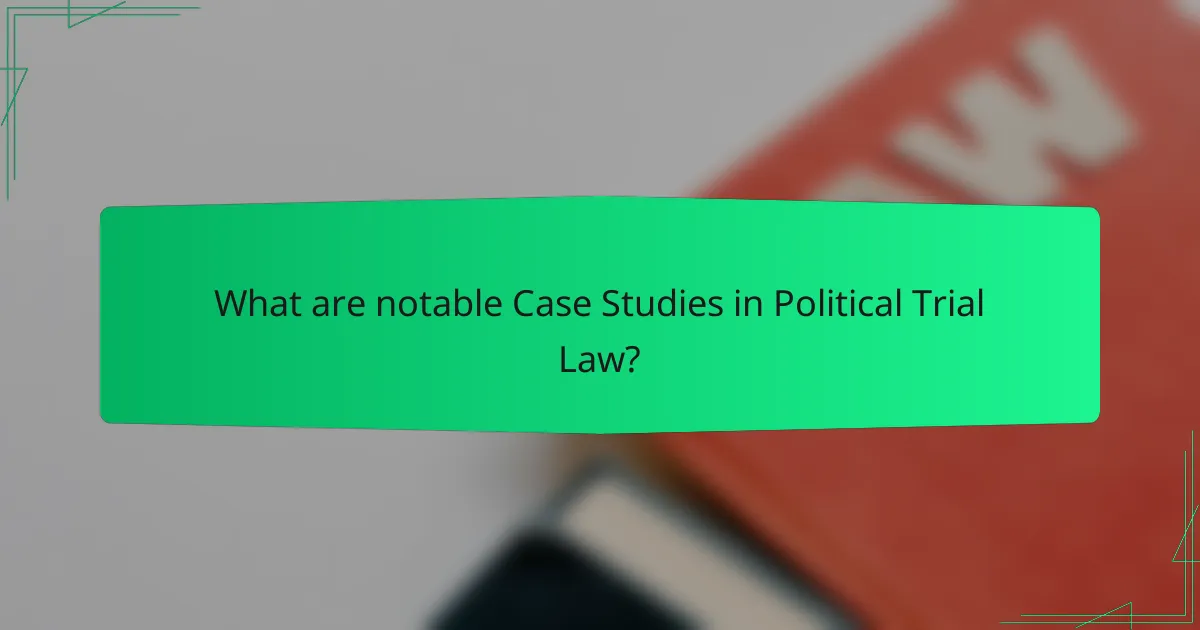
What are notable Case Studies in Political Trial Law?
Notable case studies in political trial law include the impeachment trials of U.S. Presidents. The impeachment of Andrew Johnson in 1868 is a significant example. Johnson faced charges related to his violation of the Tenure of Office Act. The trial showcased the tensions between the presidency and Congress.
Another prominent case is the impeachment of Bill Clinton in 1998. Clinton was impeached for perjury and obstruction of justice. The trial focused on his relationship with Monica Lewinsky. It highlighted the political implications of personal conduct.
The impeachment of Donald Trump in 2019 marked a historic event. Trump was charged with abuse of power and obstruction of Congress. The trial underscored partisan divides in the legislative process.
These cases illustrate the complexities of political trial law. They reflect the balance of power between branches of government. Each case has shaped the understanding of accountability in political offices.
What lessons can be learned from historical Political Trials?
Historical political trials reveal several critical lessons about governance and justice. They demonstrate the importance of due process in maintaining public trust. For example, the Nuremberg Trials highlighted the need for fair legal representation. These trials also illustrate the potential for political motives to influence judicial outcomes. The trial of Socrates serves as a cautionary tale about the dangers of mob mentality in legal proceedings. Additionally, political trials can serve as a tool for accountability, as seen in the impeachment of U.S. President Andrew Johnson. They emphasize the necessity of transparent legal frameworks to prevent abuses of power. Lastly, historical political trials remind us of the ongoing struggle between justice and political expediency.
How did the outcomes of these trials shape legislation?
Outcomes of trials significantly influenced legislation by highlighting the need for reform. For instance, publicized trial results often revealed systemic issues. These revelations prompted lawmakers to address gaps in existing laws. Legislative bodies frequently responded with new regulations to enhance accountability. Trials also served as a catalyst for public discourse on legal standards. This discourse pressured legislators to act swiftly. Historical examples include the Watergate scandal, which led to the Ethics in Government Act. Such legislation aimed to prevent future abuses of power.
What precedents were set by landmark Political Trials?
Landmark political trials have established significant legal precedents that shape judicial processes. These trials often address the balance of power between government branches. They have clarified the limits of executive privilege and accountability. For instance, the trial of President Andrew Johnson in 1868 set a precedent for impeachment standards. The Watergate scandal led to the United States v. Nixon case, affirming that no person is above the law. These trials have also influenced due process rights for public officials. They underscore the importance of transparency and accountability in governance. Overall, landmark political trials have reinforced the rule of law in democratic societies.
How do contemporary Political Trials reflect current legal challenges?
Contemporary political trials illustrate significant current legal challenges. They often highlight issues such as judicial impartiality and the rule of law. High-profile cases, like those involving political leaders, reveal potential biases in legal proceedings. These trials can expose the tension between political power and judicial independence. For example, trials against former leaders often raise questions about the motivations behind legal actions. Additionally, the media’s role in shaping public perception complicates the legal landscape. The intersection of law and politics becomes increasingly scrutinized during these trials. Observers note that outcomes can influence public trust in the legal system. Overall, contemporary political trials serve as a barometer for the health of democratic institutions and legal frameworks.
What recent Political Trials have garnered significant attention?
Recent political trials that have garnered significant attention include the trial of former President Donald Trump. This trial involves charges related to election interference and incitement of insurrection. Another notable case is the trial of former South Korean President Park Geun-hye. She was convicted of corruption and abuse of power, leading to her impeachment in 2017. Additionally, the trial of Brazilian President Jair Bolsonaro is under scrutiny for alleged misconduct during the COVID-19 pandemic. These trials are significant due to their implications for political accountability and governance. They reflect ongoing tensions in their respective countries regarding leadership and legal responsibility.
How are modern trials addressing issues of fairness and justice?
Modern trials are addressing issues of fairness and justice through enhanced procedural safeguards and transparency measures. These trials implement jury diversity to ensure representation from various demographics. Additionally, they utilize technology to improve evidence presentation and accessibility. The introduction of legal aid services helps to level the playing field for defendants. Courts are increasingly adopting restorative justice practices to focus on healing rather than punishment. Legislative reforms are also in place to prevent biases in sentencing. Studies show that these measures contribute to more equitable outcomes in the justice system. For example, a report by the National Center for State Courts highlights the positive impact of diversity in jury composition on trial fairness.
What best practices can enhance Legislative Oversight in Political Trials?
Implementing transparency is a best practice that can enhance legislative oversight in political trials. Transparency ensures that the processes and decisions are visible and understandable to the public. It allows stakeholders to monitor the actions taken during trials. Regular reporting on trial progress and findings can also foster accountability.
Another best practice is establishing clear guidelines for legislative participation. These guidelines should outline the roles and responsibilities of legislators in the oversight process. This clarity can prevent confusion and ensure that legislators are effectively engaged.
Additionally, fostering collaboration between legislative bodies and judicial authorities can improve oversight. Joint committees can be formed to address specific trials. This collaboration can lead to shared insights and more comprehensive oversight.
Training legislators on legal processes and trial procedures is also essential. Well-informed legislators can make better decisions and provide more effective oversight.
Finally, utilizing technology for real-time monitoring and reporting can enhance oversight efficiency. Digital platforms can facilitate the sharing of information and updates among stakeholders. This approach can lead to a more informed public and greater legislative accountability.
Political Trial Law refers to the legal framework governing trials involving political figures or issues, while Legislative Oversight encompasses the review and supervision of government actions by legislative bodies. This article examines the intersection of these concepts, highlighting their importance in ensuring accountability and transparency within democratic systems. Key topics include the differences between political and regular trials, the legal frameworks that govern them, and the mechanisms of accountability such as legislative oversight and judicial scrutiny. Notable case studies illustrate historical precedents and contemporary challenges in political trial law, emphasizing the ongoing relevance of these issues in today’s legal landscape.
